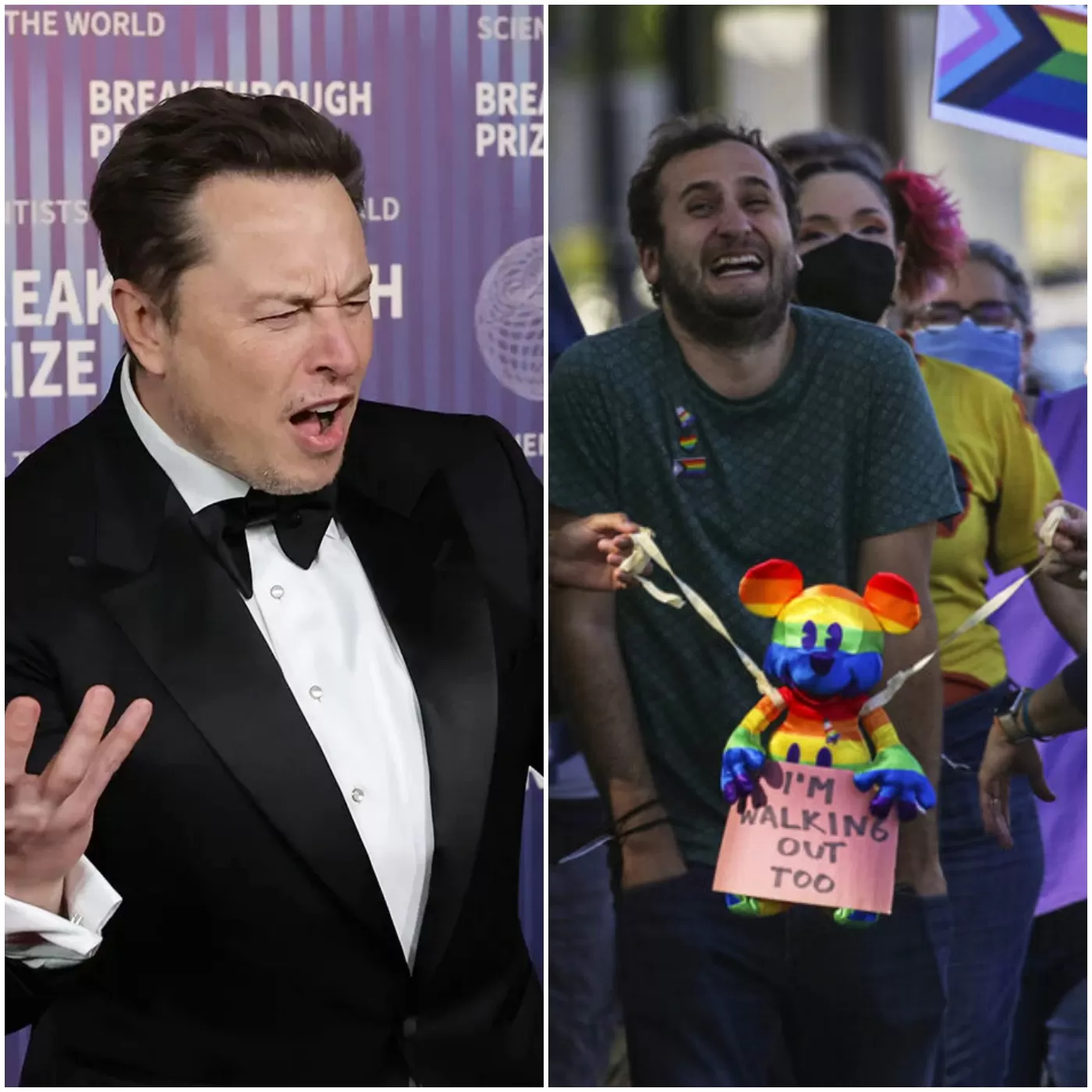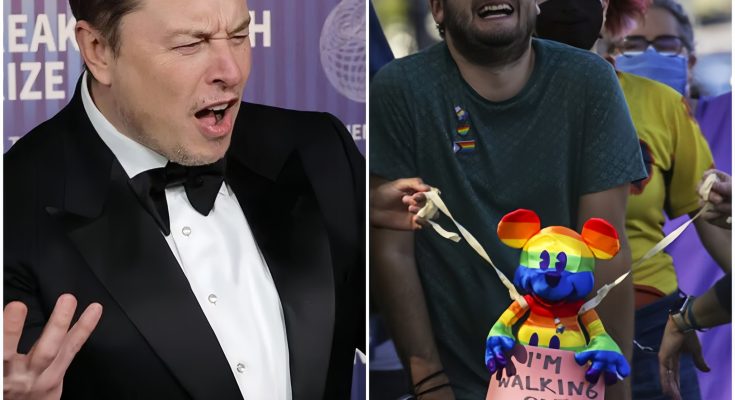The Buffalo Bills, a franchise known for their passionate fan base and history of competitive football, have recently found themselves at the center of a storm of controversy. After a significant public spat with Elon Musk, the team has not only been banned from X (formerly Twitter), but they have also seen a staggering loss of $650 million in sponsorship deals. The catalyst for this fallout? The team’s vocal support for the NFL’s rainbow flag during Pride Month, a move that sparked outrage among some fans and corporate sponsors. But in a surprising turn of events, the Buffalo Bills have issued a mocking, yet bold statement in response to their predicament, using just ten words to express their defiance.

The saga began when the Buffalo Bills joined a growing number of NFL teams showing support for the LGBTQ+ community, especially during Pride Month. The NFL, as part of its inclusivity initiatives, embraced the rainbow flag as a symbol of pride and solidarity with LGBTQ+ fans and players. The Buffalo Bills, much like many other teams, publicly displayed their support by incorporating the rainbow flag into their social media campaigns, in-game promotions, and team merchandise.

However, their move to support the LGBTQ+ cause did not sit well with a faction of fans and business partners. Some of these critics, notably high-profile individuals on social media, began voicing their displeasure, and the situation escalated when billionaire entrepreneur Elon Musk, the owner of X (formerly Twitter), publicly condemned the NFL’s stance and threatened to sever ties with organizations that supported the rainbow flag.

Musk, known for his strong opinions on a variety of issues, argued that corporate pandering to social justice causes was detrimental to both business and society. He expressed his belief that companies should focus solely on their core products and services, rather than engaging in political or social activism. This sentiment resonated with a segment of Musk’s social media followers, many of whom are staunchly opposed to LGBTQ+ advocacy in sports.
As the controversy brewed on X, Musk took the drastic step of banning the official Buffalo Bills account from the platform, citing the team’s support for the rainbow flag as a primary reason for the ban. This move sent shockwaves through the sports world, especially considering the role social media plays in modern-day sports marketing and fan engagement. The Bills were left in the digital wilderness, unable to communicate with their millions of followers on one of the most important platforms for professional sports.
The fallout from the public dispute with Musk was swift and severe. In the wake of the team’s ban from X, several key sponsors, who had previously been aligned with the Bills, chose to distance themselves from the franchise. The decision to support the rainbow flag, despite being a gesture of inclusivity, had inadvertently alienated a group of corporate sponsors who were wary of potential backlash from their own customer bases. In total, the Buffalo Bills lost an eye-watering $650 million in sponsorship revenue, a financial blow that has rocked the team to its core.
Many of these sponsors cited the controversy surrounding the LGBTQ+ support as a major factor in their decision to pull out. Companies with conservative leanings or those concerned with maintaining a neutral public image chose to sever ties with the team, fearful of losing customers or facing protests. These sponsorship losses, combined with the growing tension on social media, left the Bills scrambling to find a way to navigate this complex situation.
Despite the setbacks, the Buffalo Bills have not backed down from their stance on inclusivity. In fact, the team responded to the entire situation with a sharp, mocking message, sending shockwaves through the media. The statement, consisting of just ten words, reads: “We lost $650 million, but we stand by our values.”
The statement has been met with mixed reactions. On one hand, supporters of the LGBTQ+ community and those who advocate for social justice in sports have praised the team for remaining steadfast in their beliefs, regardless of the financial consequences. The Bills’ response can be interpreted as a defiant stand, signaling to the world that the team values inclusivity and social progress over financial gain. On the other hand, critics have derided the statement as a reckless refusal to address the very real financial and reputational damage the team has suffered.
In many ways, the Buffalo Bills’ response encapsulates the tension at the heart of this controversy. While some fans and businesses are eager to see sports teams embrace diversity and inclusivity, others feel that these issues should not be intertwined with the business side of professional sports. The Bills, by issuing such a bold statement, have made it clear that they are unwilling to compromise on their values—no matter the cost.
Elon Musk’s involvement in the dispute has only complicated matters for the Buffalo Bills. As the owner of X, Musk holds significant sway over the platform, and his decision to ban the team has amplified the visibility of the issue. Musk’s actions have sparked debates about free speech, corporate influence, and the role of social media in shaping public opinion. Some argue that his ban of the Buffalo Bills is an overreach, an attempt to impose his personal values on a sports team that simply wanted to support a social cause. Others contend that Musk has every right to control the platform in the way he sees fit, particularly when it comes to the companies and individuals that utilize it for marketing and communication purposes.
The incident has also raised questions about the intersection of politics and business in modern sports. Should professional teams be expected to take political stances? Is it fair for businesses to pull sponsorships over a team’s social justice efforts? And, perhaps most importantly, should the NFL and other sports leagues consider the broader financial consequences when making decisions about inclusivity and activism?
Looking ahead, the future of the Buffalo Bills and their place within the NFL’s inclusivity agenda remains uncertain. The loss of sponsorships and the digital fallout from Musk’s ban could have lasting consequences for the team’s brand and financial standing. However, the team’s unwavering commitment to their values may resonate with a different group of fans and corporate sponsors—those who believe that sports should be a platform for social change.
The Bills’ actions have also sparked a larger conversation about the role of professional sports in addressing social justice issues. As more teams follow the Bills’ lead in supporting LGBTQ+ rights and other causes, it will be interesting to see how the sports world navigates the complex relationship between activism, business, and fan engagement.
In conclusion, while the Buffalo Bills may have lost $650 million in sponsorships, they have gained something arguably more valuable: the respect of those who believe in standing up for what’s right, even in the face of adversity. Whether or not this will be enough to secure their long-term success, both on and off the field, remains to be seen.




